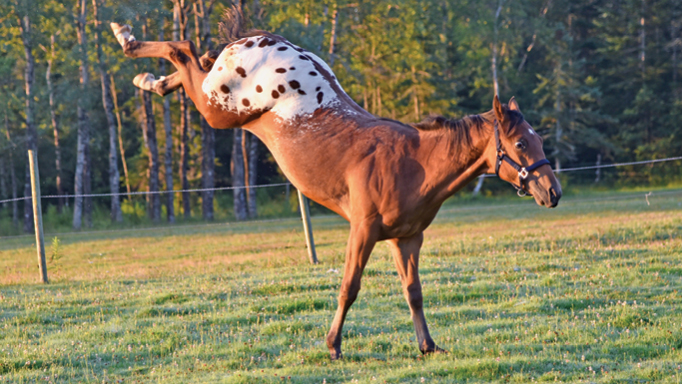
To understand why a horse bucks, it is helpful to take a closer look at the circumstances before the actual bucking takes place. Horses buck for several reasons, the causes may be quite diverse, but ultimately the action remains still the same: an unexpected rodeo witnessed firsthand. If your horse bucks often, hold on tight and learn about what can be done to reduce this behavior.
Reasons Horses Buck
Joy of Life
Horses can be quite vivacious creatures; the view of a green pasture may give a horse the instinct to run and celebrate life by acting exuberant and bucking a few times. You can see this behavior already in colts that playfully run around the paddock looking for new adventures for the day. Seeing a horse buck from joy is a pleasure, perhaps a little less if you are riding him.
Pent Up Energy
Horses that have been closed in the stables for a few days, may run and buck when they are let out. This is normal behavior due to excessive energy. Horses need a lot of daily exercise and if your horse remains in a stall for a few days either because of inclement weather or because of a temporary injury, once out your horse may be quite hyperactive.
High Energy Foods
If your horse is on a high energy diet such as oats, this may cause him to feel much more energetic and will therefore, be more likely to buck to release this excess energy. Too much fuel ends up creating a horse with too much energy.
Unfit Equipment
Is the saddle the correct size for your horse, sometimes a saddle of the wrong size may cause pain and continuous friction which may turn painful. Is the girth too tight? This may cause chaffing to the sensitive skin areas. Is the bit causing problems? Sometimes the bit may be painful on horses with dental problems.
Lack of Training
If the horse is very young and not used to wearing a saddle or having somebody ride him, it will be an instinct to buck to get the saddle or the rider off. With more training and time, these young horses eventually will get used to the saddle and will buck less and less.
Back Pain
Horses with a history of bucking sometimes are sometimes diagnosed with a case of back pain. It is certainly something to look into if the horse bucks frequently, especially if the bucking occurs mostly when the saddle is placed and the rider is on top.
How to Stop a Horse from Bucking
Often riders can tell when a horse is about to buck. Most horses will lower their head to buck efficiently. Preventing a horse from lowering the head may make it difficult for a horse to buck. Another method is to pull the reins to the left or the right allowing the horse to touch your leg with its nose. This position will not allow bucking. Turning in tight circles may help as well and may discourage the behavior in the long run.
Horses buck for several reasons. It is the owner’s or rider’s job to figure out what is causing the bucking and to react appropriately. Hyperactive horses should be kept in a corral to release the excessive energy before being ridden, horses that eat high energy foods should undergo a diet change, horses with suspected back pain should see a veterinarian or chiropractor and horses that simply love life should be allowed to enjoy it as much as they can along with their owners.
Provided by Creatures Corner reader Janet Farricelli
Related Articles & Free Email Newsletter Sign Up
4 Inexpensive and Easy Horse Care Ideas
How to Calm an Excitable Horse Why You Are in the Saddle




Comment here